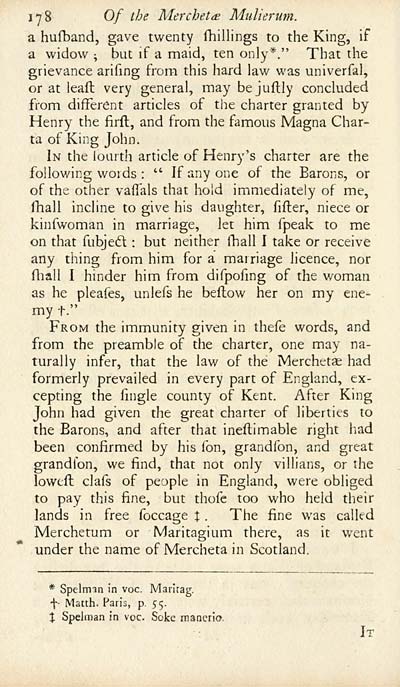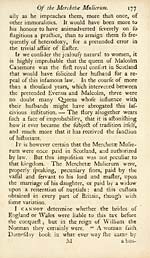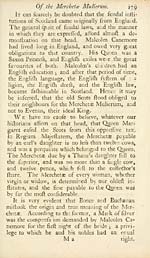Blair Collection > Critical dissertations on the origin, antiquities, language, government, manners, and religion, of the antient Caledonians, their posterity the Picts, and the British and Irish Scots
(216)
Download files
Complete book:
Individual page:
Thumbnail gallery: Grid view | List view

178 Of the Mercheta Mulierum.
a hufband, gave twenty fhillings to the King, if
a widow ; but if a maid, ten only*." That the
grievance arifing from this hard law was univerfal,
or at leaft very general, may be juflly concluded
from different articles of the charter granted by
Henry the firfl, and from the famous Magna Char-
ta of King John.
In the lourth article of Henry's charter are the
following words : " If any one of the Barons, or
of the other vaffals that hold immediately of me,
Ihall incline to give his daughter, fifler, niece or
kinfwoman in marriage, let him fpeak to me
on that fubjed : but neither lliall I take or receive
any thing from him for a marriage licence, nor
fliall I hinder him from difpofmg of the woman
as he pleafes, unlefs he beftow her on my ene-
my t."
From the immunity given in thefe words, and
from the preamble of the charter, one may na-
turally infer, that the law of the Merchetae had
formerly prevailed in every part of England, ex-
cepting the frngle county of Kent. After King
John had given the great charter of liberties to
the Barons, and after that ineftimable right had
been confirmed by his fon, grandfon, and great
grandibn, we find, that not only villians, or the
lowcft clafs of people in England, were obliged
to pay this fine, but thofe too who held their
lands in free foccage % . The fine was called
Merchetum or Maritagium there, as it went
under the name of Mercheta in Scotland.
* Spelman In voc. Marirag.
f- Matth. Paris, p, 55.
} Spelman in voc. Soke mancria
a hufband, gave twenty fhillings to the King, if
a widow ; but if a maid, ten only*." That the
grievance arifing from this hard law was univerfal,
or at leaft very general, may be juflly concluded
from different articles of the charter granted by
Henry the firfl, and from the famous Magna Char-
ta of King John.
In the lourth article of Henry's charter are the
following words : " If any one of the Barons, or
of the other vaffals that hold immediately of me,
Ihall incline to give his daughter, fifler, niece or
kinfwoman in marriage, let him fpeak to me
on that fubjed : but neither lliall I take or receive
any thing from him for a marriage licence, nor
fliall I hinder him from difpofmg of the woman
as he pleafes, unlefs he beftow her on my ene-
my t."
From the immunity given in thefe words, and
from the preamble of the charter, one may na-
turally infer, that the law of the Merchetae had
formerly prevailed in every part of England, ex-
cepting the frngle county of Kent. After King
John had given the great charter of liberties to
the Barons, and after that ineftimable right had
been confirmed by his fon, grandfon, and great
grandibn, we find, that not only villians, or the
lowcft clafs of people in England, were obliged
to pay this fine, but thofe too who held their
lands in free foccage % . The fine was called
Merchetum or Maritagium there, as it went
under the name of Mercheta in Scotland.
* Spelman In voc. Marirag.
f- Matth. Paris, p, 55.
} Spelman in voc. Soke mancria
Set display mode to: Large image | Transcription
Images and transcriptions on this page, including medium image downloads, may be used under the Creative Commons Attribution 4.0 International Licence unless otherwise stated. ![]()
| Permanent URL | https://digital.nls.uk/76288987 |
|---|
| Description | A selection of books from a collection of more than 500 titles, mostly on religious and literary topics. Also includes some material dealing with other Celtic languages and societies. Collection created towards the end of the 19th century by Lady Evelyn Stewart Murray. |
|---|
| Description | Selected items from five 'Special and Named Printed Collections'. Includes books in Gaelic and other Celtic languages, works about the Gaels, their languages, literature, culture and history. |
|---|

